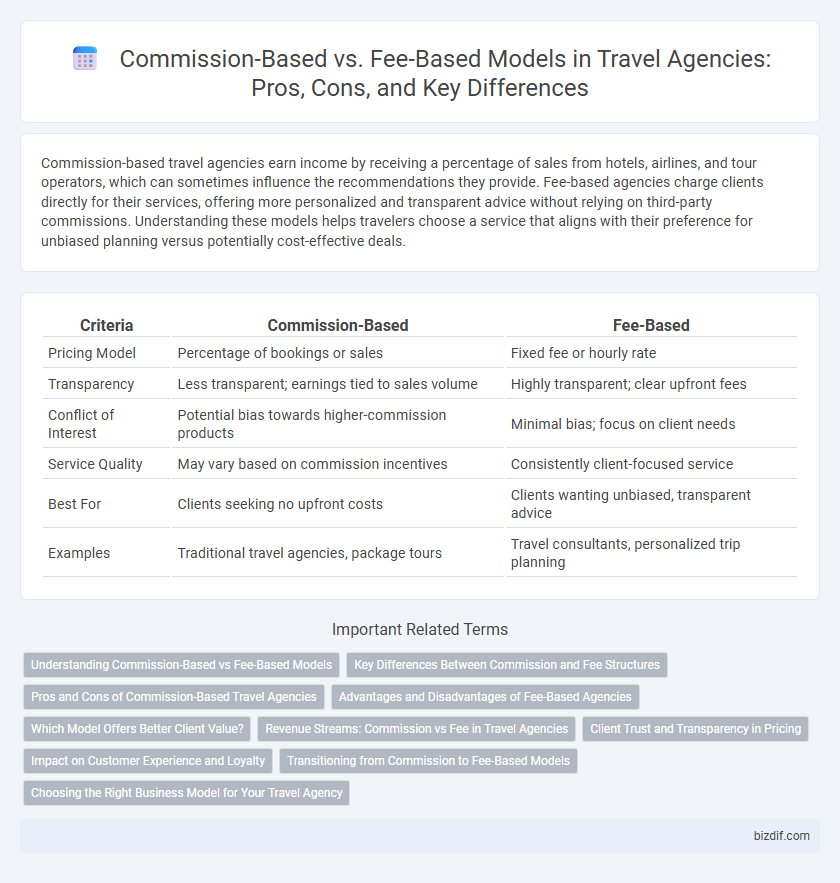Commission-based travel agencies earn income by receiving a percentage of sales from hotels, airlines, and tour operators, which can sometimes influence the recommendations they provide. Fee-based agencies charge clients directly for their services, offering more personalized and transparent advice without relying on third-party commissions. Understanding these models helps travelers choose a service that aligns with their preference for unbiased planning versus potentially cost-effective deals.
Table of Comparison
| Criteria | Commission-Based | Fee-Based |
|---|---|---|
| Pricing Model | Percentage of bookings or sales | Fixed fee or hourly rate |
| Transparency | Less transparent; earnings tied to sales volume | Highly transparent; clear upfront fees |
| Conflict of Interest | Potential bias towards higher-commission products | Minimal bias; focus on client needs |
| Service Quality | May vary based on commission incentives | Consistently client-focused service |
| Best For | Clients seeking no upfront costs | Clients wanting unbiased, transparent advice |
| Examples | Traditional travel agencies, package tours | Travel consultants, personalized trip planning |
Understanding Commission-Based vs Fee-Based Models
Commission-based travel agencies earn revenue by receiving a percentage of the total booking cost from airlines, hotels, or tour operators, incentivizing them to promote specific suppliers. Fee-based models charge clients directly for services like trip planning and consultation, offering transparent pricing without reliance on third-party commissions. Understanding these models helps travelers choose agencies aligned with their preferences for cost structure and service customization.
Key Differences Between Commission and Fee Structures
Commission-based travel agencies earn a percentage of the total booking price from suppliers like airlines, hotels, or tour operators, incentivizing agents to promote higher-cost options. Fee-based agencies charge clients directly through flat fees or hourly rates, ensuring transparent pricing and unbiased recommendations without supplier influence. Understanding the key differences helps travelers and agents choose the right model based on budget transparency and service preferences.
Pros and Cons of Commission-Based Travel Agencies
Commission-based travel agencies earn income through commissions paid by airlines, hotels, or tour operators, allowing clients to access services at no upfront cost. This model incentivizes agents to promote specific suppliers, which may limit objective recommendations and lead to potential conflicts of interest. However, commission-based agencies often provide extensive network connections and personalized service without direct fees, benefiting travelers seeking convenience and cost savings.
Advantages and Disadvantages of Fee-Based Agencies
Fee-based travel agencies offer transparent pricing by charging clients upfront fees instead of earning commissions from bookings, which eliminates potential conflicts of interest and ensures unbiased recommendations. This model fosters trust and allows agents to tailor travel plans specifically to client preferences without prioritizing sellers' incentives. However, fee-based services may deter price-sensitive customers who prefer zero upfront costs, and agents must clearly communicate the value to justify the fee.
Which Model Offers Better Client Value?
Commission-based travel agencies earn income from suppliers, which can influence their recommendations but often provide clients with complimentary services or upgrades. Fee-based agencies charge clients directly, promoting unbiased advice tailored to individual needs without supplier incentives. Understanding the differences helps travelers choose agencies that align with their priorities for transparency and personalized value.
Revenue Streams: Commission vs Fee in Travel Agencies
Travel agencies generate revenue primarily through commission-based and fee-based models, where commissions are earned from suppliers like airlines, hotels, and tour operators for booking services. Fee-based agencies charge clients directly a flat fee or percentage for planning and consulting, providing transparent pricing without relying on supplier incentives. Hybrid models combine both streams, maximizing income by balancing supplier commissions alongside client fees for specialized services.
Client Trust and Transparency in Pricing
Commission-based travel agencies earn revenue through partnerships with hotels, airlines, and tour operators, which may lead clients to question the impartiality of recommendations. Fee-based models charge clients directly for services, promoting transparency and fostering stronger trust by clearly outlining costs upfront. Clients often prefer fee-based agencies for honest advice and confidence in receiving unbiased travel planning tailored to their interests.
Impact on Customer Experience and Loyalty
Commission-based travel agencies may prioritize selling packages with higher commissions, potentially limiting personalized options and reducing customer trust. Fee-based models align agency incentives more closely with client interests, promoting transparent advice and tailored itineraries that enhance satisfaction and foster long-term loyalty. Customers often perceive fee-based services as more objective and trustworthy, which significantly impacts repeat business and positive referrals.
Transitioning from Commission to Fee-Based Models
Transitioning from commission-based to fee-based models in travel agencies involves shifting the revenue structure from relying on supplier commissions to charging clients directly for personalized services. This change enhances transparency and aligns agency incentives with client interests, often improving customer trust and satisfaction. Agencies must adapt their marketing strategies and client communication to clearly convey the value of fee-based advisory services in a competitive market.
Choosing the Right Business Model for Your Travel Agency
Selecting the ideal business model for your travel agency involves weighing commission-based and fee-based structures to maximize profitability and client satisfaction. Commission-based models generate income through partnerships with airlines, hotels, and tour operators, incentivizing volume sales but potentially limiting transparency. Fee-based models emphasize direct client payments for personalized services, enhancing trust and revenue predictability while requiring robust value propositions to attract discerning travelers.
Commission-based vs Fee-based Infographic

 bizdif.com
bizdif.com